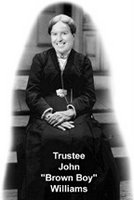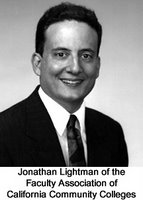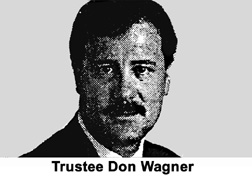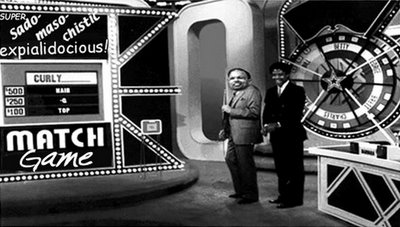
 he recent spectacle of a right-wing born-again Christian Indian-American former Chemistry professor turned community college district Chancellor dressing up as the whimsically racist Johnny Carson “Tonight Show” seer “Carnac the Magnificent” offers to the willing seat-warmer in our stuffy Theater of the Absurd yet another opportunity to mine previously unexplored strata of irony, mystery and horror. As if having a Holocaust denier on the board, Creationists and homophobes in positions of policy-making, and a low-level dean who proposed (all on his own, bless his tiny little head) construction of a 700 million dollar entertainment complex on the campus (See) were not, well, enough already.
he recent spectacle of a right-wing born-again Christian Indian-American former Chemistry professor turned community college district Chancellor dressing up as the whimsically racist Johnny Carson “Tonight Show” seer “Carnac the Magnificent” offers to the willing seat-warmer in our stuffy Theater of the Absurd yet another opportunity to mine previously unexplored strata of irony, mystery and horror. As if having a Holocaust denier on the board, Creationists and homophobes in positions of policy-making, and a low-level dean who proposed (all on his own, bless his tiny little head) construction of a 700 million dollar entertainment complex on the campus (See) were not, well, enough already.  One weeps with despair and delight, as if peeling the world’s largest onion, a fragrant and generous bulb of paradox and incongruity, an organic life force. It is an impossible and rotten fruit. While trying to find its center one laughs and cries at the same time, simply overwhelmed at the fecundity and awesome pungency of it even as it disappears in one’s hand.
One weeps with despair and delight, as if peeling the world’s largest onion, a fragrant and generous bulb of paradox and incongruity, an organic life force. It is an impossible and rotten fruit. While trying to find its center one laughs and cries at the same time, simply overwhelmed at the fecundity and awesome pungency of it even as it disappears in one’s hand. Hell, it’s like watching those people who, genuinely awed by M.C. Escher drawings, can be tricked into giving you their credit cards, cars, and young children. “Neat,” they marvel, “the way the fish becomes the chicken and then a gull. Neat-o!”
 o, kids, here’s a fun game. In light of Chancellor Raghu Mathur’s unlikely moment of inspired or simply insane vaudevillian performance art, we know you’ll enjoy playing a game of modest subliminal political association and speculation, all for entertainment and more of the jolly sado-masochism so darn available here at Dissent the Blog.
o, kids, here’s a fun game. In light of Chancellor Raghu Mathur’s unlikely moment of inspired or simply insane vaudevillian performance art, we know you’ll enjoy playing a game of modest subliminal political association and speculation, all for entertainment and more of the jolly sado-masochism so darn available here at Dissent the Blog.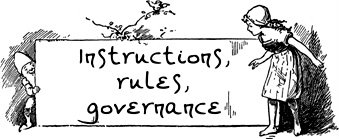 Match the real-life district personality with the fictional, literary, or historical character you’d expect them most likely (and by that we mean least likely) to dress up as in, say, an official college function, e.g., the Chancellor's Opening Session.
Match the real-life district personality with the fictional, literary, or historical character you’d expect them most likely (and by that we mean least likely) to dress up as in, say, an official college function, e.g., the Chancellor's Opening Session.Choose as many as you can stand.
Extra points for an essay answer in which you use the phrase “laser beam” or “fiscal conservative.”
Oh, and remember to bring your camera!
 Warning: Any resemblance to characters living, dead or in administration is simply a realistic audio-video simulacrum powered by the work of the little hamster. You know, the one trapped on that treadmill now installed in your head courtesy of Human Resources.
Warning: Any resemblance to characters living, dead or in administration is simply a realistic audio-video simulacrum powered by the work of the little hamster. You know, the one trapped on that treadmill now installed in your head courtesy of Human Resources.Steven Frogue: Franz Liebkind, Aloys Shicklgruber, Joseph Vissarionovich Dzhugashvili, Marshal Philippe Petain, Vidkun Quisling.
Dave Lang: Inspector Clouseau, Elmer Fudd, Polonious, Super Mario.
Don Wagner: Hamilton Burger, Newt Gingrich, Whittaker Chambers, Donald Segretti.
John Williams: Officer Krupke, Major-General Stanley, Sergeant Joe Friday, J. Edgar Hoover, Barney Fife.
Howard Gensler: Frank Lloyd Wright, Albert Speer, Howard Roark, Conrad Hilton, Dagwood Bumpstead, Alfred E. Neuman, or Randall from “Monster’s Inc.”
Thomas Fuentes: Generalissimo Francisco Franco, Roy Cohn, Spiro Agnew, Tom DeLay, Randy “Duke” Cunningham, Robert Schuller.
Dennis White: Betty White, Barry White, Macy’s parade balloon of Snow White, Dennis Mitchell.
Glenn Roquemore: Raghu Mathur, Thomas Fuentes, Charlie McCarthy, Mortimer Snerd, the Horta, Ruff the Dog, Jackie Battley Gingrich.


